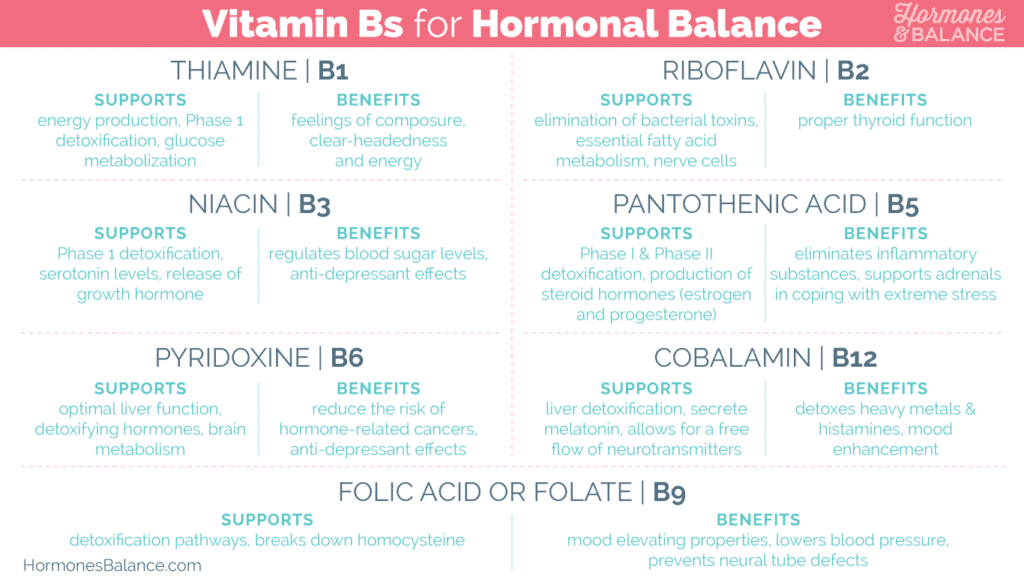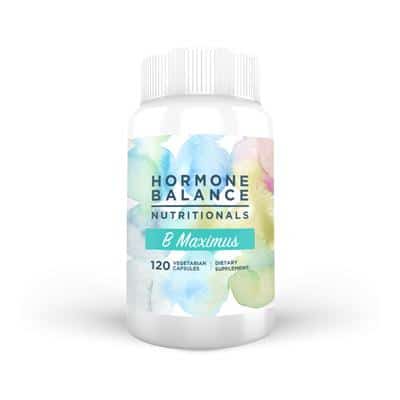B Vitamins for Your Hormones

Let’s explore the world of B Vitamins.
They are powerful vitamins to be reckoned with to stay healthy, sharp, energetic, balanced, and clean (they play a huge role in the detoxification process).
—- For our recommended supplements, scroll to the bottom of this post —-
The B vitamins are critical for efficient liver detoxification of unwanted chemicals such as heavy metals, histamines, and bacterial toxins that could be at the root of your immune or neurological challenges.
In addition, the B-complex vitamins have dramatic mood-elevating effects—more so than almost any other nutrient!
This complex of vitamins is crucial for nerve function and nerve cell metabolism, which produce optimal neurotransmitter levels.
Below is a simple outline of some of the crucial B vitamins to include in your DAILY PROTOCOL.
Thiamine (B1)
Thiamine is needed to produce energy.
Like all the other B vitamins it activates Phase I detoxification where foreign substances are initially broken down into intermediates for excretion.
Balanced levels of thiamine also allow for feelings of composure, clear-headedness, and energy.
Thiamine also helps to metabolize glucose. Women addicted to carbohydrates are often thiamine deficient.
Food sources: vegetables, whole grains, nuts, seeds, legumes, seaweed
Optimal daily dose: 25 to 50mg
Riboflavin (B2)
Deficiency of vitamin B2 inhibits the liver detox pathway that eliminates bacterial toxins.
B2 is also necessary for essential fatty acid metabolism, which improves energy production in certain nerve cells.
Riboflavin is involved in proper thyroid function.
Food sources: whole grains, legumes, green leafy vegetables, poultry, fish, seaweed
Optimal daily dose: 25 to 50mg
Niacin (B3)
Like B1, B3 induces Phase I detoxification.
Niacin also helps to regulate blood sugar levels.
It has an indirect effect on serotonin levels, because the body uses tryptophan (the amino acid that is the precursor to serotonin production), to produce niacin.
It has an effect on the adrenal hormones.
For all these reasons, it’s said to have prominent anti-depressant effects.
Niacin also promotes the release of growth hormone.
Food sources: liver, peanuts, sesame seeds, sunflower seeds, brown rice, whole grains, barley, almonds, seaweed.
Optimal daily dose: 25 to 50mg.
Pantothenic acid (B5)
Pantothenic acid provides foundational support for both Phase I and Phase II detoxification, and more specifically, the elimination of inflammatory substances.
It plays an important role in the production of adrenal hormones and is vital for coping with extreme stress.
All the steroid hormones, such as estrogen and progesterone, will be produced only with ample B5 in the system.
Food sources: avocado, mushrooms, liver, soybeans, banana, collard greens, sunflower seeds, lentils, broccoli, brown rice, eggs.
Optimal daily dose: 25 to 50mg.
Pyridoxine (B6)
Sufficient levels of B6 keep the liver functioning optimally by promoting the proper flow of fat and bile to and from the liver.
Also of note is that Pyridoxine has one of the most dramatic mood-elevating effects of all the B vitamins.
It can help to correct brain metabolism dysfunctions that cause depression. It heightens serotonin production.
It binds to estrogen, progesterone, and testosterone, helping to detoxify excess amounts of these steroid hormones, helping to reduce the risk of hormone-related cancers.
Food sources: spinach, walnuts, eggs, fish, poultry, beans, seaweed.
Optimal daily dose: 25 to 50mg, not to exceed 100mg/day
Cobalamin (B12)
B12 is an important factor for the activation of the liver detox pathway that detoxes the heavy metals and histamines.
Cobalamin has important effects on mood and allows for a free flow of neurotransmitters.
It also helps the body to secrete melatonin.
I recommend B12 in a methylated form (methylcobalamin) since 70% of our population has MTHFR mutations.
Food sources: animal protein (especially liver), seafood, eggs, some cheeses, tempeh, sea vegetables, brewer’s yeast, blue and green algae, chlorella, seaweed, bee pollen.
Optimal daily dose: 50 to 100mcg
Folate (B9)
Folate is a needed inducer of several of the detoxification pathways.
It breaks down homocysteine, a toxic and inflammatory agent produced by the liver if not properly converted.
Folate has direct mood elevating properties and is synergistic with serotonin production.
There have been studies that show that folic acid helps lower ACTH, which is an adrenal hormone that leads to increased blood pressure.
For childbearing women, folate in the system will help to prevent neural tube defects and their resulting brain and nervous system damage to the baby.
Avoid folic acid in food and supplements – it is the synthetic version of folate. Folic acid attaches itself to the folate receptors, blocking the folate to do its work. Many processed foods including flours contain folic acid.
Food sources: dark leafy greens, asparagus, bananas, cantaloupes, beans.
Optimal daily dose: 400 to 800 mcg
Recommended B Complex Supplement
For some people, especially when depleted, it’s hard to get all the needed B vitamins from food.
This is when a supplement can become very helpful in your healing journey.
Our Hormone Balance Nutritionals B Maximus is a complete B complex formulated with key B vitamins in their metabolically active form.
The active form of this B vitamins allows the body to use them readily without having to convert them, especially for those with MTHFR genetic defect (methycobalamin).
B vitamins are key in detoxification and hormonal balance.
I don’t take many supplements but B Maximus is part of my daily protocol.
Additional ingredients: TMG and choline were also added to support methylation.
Made with non-GMO ingredients. Free of gluten, dairy, soy, yeast, sugar, and colors.
Practical tip: Take vitamin Bs in the morning as they can be stimulating and keep you awake if taken at night.
I’ve learned it the hard way!
How to get Vitamin B from Food?
Learn how to rebalance your hormones with food in my cookbook Cooking for Hormone Balance.


















